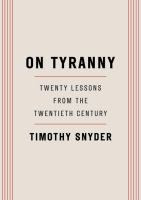Publisher:New York : Tim Duggan Books, [2017]
Edition:First edition.
ISBN:9780804190114
Characteristics:126 pages
A very good overview of humans passion for inflicting suffering on other humans. Timothy Snyder is a professor of History at Yale, and this book is geared specifically at all the fun and games the American people are being put through by their new president. When Dr. Snyder writes it is really obvious about whom he is speaking about. The links he makes to other historical figures are quite chilling to say the least.
While this book may seem small (it's only 128 pages) each story is packed with references to all the bad stuff you learned in your world history courses in school. Most of which you have probably forgotten or suppressed if you've been out of school for any length of time.
The parallels that Mr. Snyder draws between the Trump administration, and some of his predecessors in other countries such as WW II Germany, Stalinist Russia, etc.
Many people might dismiss the comparisons that Mr. Snyder uses for his examples, but I personally find them chilling and having studied a fair amount of history (as well as taught it in school) I find them quite accurate.
Mr Snyder gives his readers 20 important lessons, that are easy to implement and designed to prevent or at the very least open the minds of the American public how the freedom they famously boast about could easily be taken from them.
This is a book that I believe all peoples should read (especially those living in the United States). Here's hoping that what could happen, never does!



